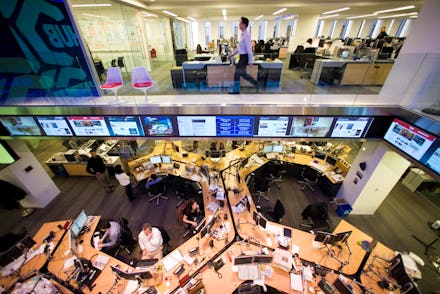The Tension Every 20-Something Journalist Faces in the Digital Age

Social media has been abuzz this week with an op-ed from the New York Times titled aptly, "Slaves of the Internet, Unite!" In it, author Tim Krieder expresses confusion and outrage over writers solicited for free labor in exchange for "exposure," "experience," or simply "flattery." One passage in particular stood out to me, a recent journalism grad, because it hit close to home: "I’ve been trying to understand the mentality that leads people who wouldn’t ask a stranger to give them a keychain or a Twizzler to ask me to write them a thousand words for nothing."
Kreider stresses to younger creatives that we shouldn't "give it away." Don’t spend thousands of dollars on an education, he says, just to let big companies take advantage of you. While I agree with his point, it made me wonder: Does our generation of writers and artists have a choice?
With the prevalence of unpaid work rising for recent graduates, especially journalism grads like myself, I worry how long we’ll be stuck "gaining experience" while unable to support ourselves financially.
Big-name companies know their positions are in high demand, yet they don’t expect younger writers to insist on realistic compensation for their work. They see desperation and vulnerability in our eyes, and they take advantage of it. The sad thing is, many of us will fight tooth and nail to get that resume-booster, with or without pay.
"It’s not paid, but it’s great exposure!" is one rationale I’m really sick of hearing. It’s easy for any young creative to get exposure online these days without relying on big companies to do it for us. We want to work for recognizable publications because they are credible, and we want to be seen as credible. We want to be professionals, not hobbyists.
Part of being a professional means being paid for your work.
Condé Nast recently ended its internship program over complaints and lawsuits from young journalists working full-time for no pay. A respected name in the publishing biz, the producers of magazines such as Vogue, Vanity Fair, and GQ should have an ethical code that doesn't involve taking advantage of young writers.
According to the Wall Street Journal, a federal judge said unpaid interns have no protection against discrimination because they are not considered employees. So not only are we sacrificing pay for our work, it’s also technically legal for us to sacrifice basic rights at the expense of a big company.
Things need to change, and time is running out. Magazines and newspapers are folding, laying off long-time staff members, and succumbing to the demands of big business owners. Are we supposed to keep working for free and wait for a time to come when we’ll maybe "make it" as full-time writers and creatives? How long do we spend climbing the ladder?
If this is the end of hiring paid, full-time journalists, the result is a decline in fact-checking, credible sources, and reliable information. If companies continue to stop paying writers and photographers to do their jobs, we'll see a flood of misinformation and hidden agendas. This will be the beginning of potentially dangerous information presented as truth.
Trading a learning experience for school credit is one thing, and volunteering your services is another. But for multi-million-dollar companies to expect young professionals to work full-time for zero dollars with the promise of maybe getting paid later on is unfair, unlawful, and needs to end.
We could and should be spending time earning an honest day's pay, not just a brand name on our resumés.